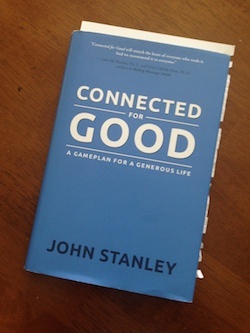 As nonprofit and church leaders, we are often called upon to encourage others to give to our organization. But can taking a closer look at our own giving help us to be better at encouraging generosity in others?
As nonprofit and church leaders, we are often called upon to encourage others to give to our organization. But can taking a closer look at our own giving help us to be better at encouraging generosity in others?
John Stanley, in his book, “Connected for Good: A Gameplan for a Generous Life,”challenges us to rethink our giving. It is a fascinating, deep study into why we give, how we give and how we can connect our giving more deeply to who we are and what we want for the world. Here’s how he states it in the introduction:
“If you’re like me, you want your giving to matter, and you want your connections to be mutually nourishing and make an impact. You know that generosity rightly understood is transformational, not transactional.”
All of us are (I hope) generous in our personal lives. While we may not have a huge amount of money to give, we likely give of our money, our time and our talents where we can. But not all giving feels the same, does it?
Sometimes we give out of obligation. (They contributed to my kid’s school fundraiser, so I’d better contribute to their kid’s.) Sometimes we give out of duty or identity. (I tithe to my church because that’s the kind of Christian I am.) Sometimes we give out of a sense of helplessness. (Those poor people who were the victim of that flood/fire/tornado/tsunami. I feel helpless, but I want to do something.)
Any one of those are worthy reasons to give, but they may or may not feed our sense of purpose in the world.
Ask yourself these questions as you think about the charitable organizations you’re involved in:
- Does it matter if the dollars come from me or someone else?
- Does it matter if the volunteer work comes from me or someone else?
- Do I give only when explicitly asked?
Chances are your answers are different, depending on the cause. If you don’t see how your contribution is unique and necessary, and if you only give when asked, that contribution (of time or money) is more transactional in nature. If the nonprofit drops you from their mail list, you probably won’t give again. If your schedule gets busy, you’ll probably skip the board meeting.
Stanley encourages his clients (and his readers) to not be reactive in their giving, but to create a “generosity gameplan” that asks them to consider what they hold most important, and to “invest” their charitable dollars and time in causes that address those needs. That means focusing the majority of an individual’s energy and resources into just a few causes, rather than donating and volunteering everywhere.
Do you have a generosity gameplan? Even if you never thought to call it that, have you been focused on certain themes or causes in your giving and volunteering over time?
Do your donors, especially your major donors, have a generosity gameplan? While you may never talk about it explicitly, have you listened for clues to the strategies behind their giving?
It’s deep water to be sure. You may realize that you’re NOT on your donor’s gameplan. You may discover the transactional nature of their giving to you. You may determine that this donor’s generosity gameplan is actually better served by giving more to another cause and less to yours.
But if you’re brave enough to think through your own game plan, and encourage others to do the same, not only would more generosity be unleashed in the world, but more donors would feel the wonderful sense of connection that comes from being an instrumental part of a worthy cause.
As Stanley says in the conclusion:
“My hope is that you move from seeing generosity as a check-writing and volunteering adventure to living and being generous in ways that expand your life and the lives of others… Connected generosity transforms you and the world in three ways: through richer relationships, gratifying acts of service, and effective giving.”
What do you think? Can more focused giving be, in the end, more generous? I’d love to hear your thoughts in the comments below.

